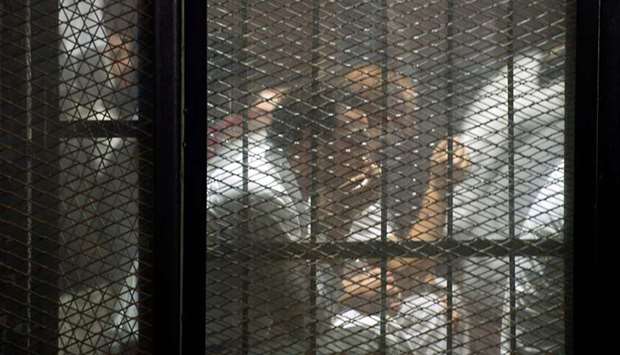An Egyptian judicial committee on Tuesday announced an asset freeze of more than 1,000 charities tied to the banned Muslim Brotherhood, as well as those of hospitals and individuals.
The funds of 1,133 charities were to be frozen, the committee said in a statement, as well as numerous other entities it said were owned by the Brotherhood.
The decision came after a law was passed earlier this year to oversee the freezing of assets of "terrorists" and "terrorist groups".
The Muslim Brotherhood was outlawed and designated a terrorist organisation in Egypt in December 2013, months after the military ousted Islamist president Mohamed Mursi following mass protests against his rule.
The judicial committee additionally announced the assets of 1,589 Brotherhood members would be frozen, including some of the movement's leaders.
Some 118 companies, 104 schools, 69 hospitals and 33 websites and satellite channels were also hit with an asset freeze.
Brotherhood members were among 75 people, including journalists whose death sentences were upheld on Saturday over clashes in 2013 between security forces and Mursi supporters.
Hundreds of others were given lengthy prison terms in one of Egypt's largest mass trials since the country's 2011 uprising, with 739 defendants facing charges.
The United Nations said the death sentences were the result of an "unfair trial" and warned if they were carried out would "represent a gross and irreversible miscarriage of justice".
The mass trial has been widely condemned by human rights organisations, with Amnesty International calling it a "grotesque parody of justice."
The 739 defendants were arrested and tried for participating in a monthlong sit-in at Rabaa al-Adawiya and al-Nahda squares in Cairo to protest the removal of Mursi.
The protest culminated in mass violence, when Egyptian security forces -- under the command of now-President Abdel Fattah el-Sisi -- attempted to clear thousands of demonstrators by using automatic weapons, armoured personnel carriers and military bulldozers. Hundreds of people were killed.
Among those sentenced to death Saturday at the Cairo Criminal Court were prominent Muslim Brotherhood members Essam El-Erian, Mohamed Beltagy, Abdel-Rahman al-Bar and Osama Yassin.
Although the verdict is considered final, the defendants can still appeal.
Another 56 defendants were sentenced to life imprisonment, including Mohamed Badie, leader of the Muslim Brotherhood.
About 200 defendants were sentenced to five years behind bars, among them photojournalist Mahmoud Abu Zeid, also known as Shawkan. As the judge finished reading their verdict, they cheered, as they have already served their time in detention and expect to be released soon.
Shawkan, 31, was arrested on August 14, 2013, while taking pictures of security forces dispersing the Rabaa sit-in. He was awarded the Press Freedom Prize by the United Nations cultural agency Unesco in April.
The government's actions in dispersing the Rabaa Adawiya square protest were widely condemned by international rights organisations. At least 817 people were killed in the violence, a 2014 report by Human Rights Watch found.

Detainees inside the soundproof glass dock of the courtroom during the trial of 700 defendants including Egyptian photojournalist Mahmoud Abu Zeid, widely known as Shawkan, in the capital Cairo, last Saturday.
